The Concept of Sovereignty: Evolution, Tools, and Reliance Today
VerifiedAdded on 2022/12/26
|5
|1012
|56
Essay
AI Summary
This essay examines the concept of sovereignty, tracing its evolution from a primarily European idea to a globally recognized principle. It explores the tools and factors that facilitated this transformation, highlighting sovereignty's role in protecting citizen rights and maintaining national autonomy in an era of increasing globalization. The essay delves into historical perspectives, referencing key figures like Jean Bodin and Thomas Hobbes, and discusses how sovereignty is essential for nations to navigate international agreements and safeguard their internal affairs. It emphasizes the significance of sovereignty in securing liberties and rights, particularly in the face of external influences and the challenges posed by global interconnectedness. The analysis underscores the importance of sovereignty in contemporary political discourse and its ongoing relevance in the 21st century.
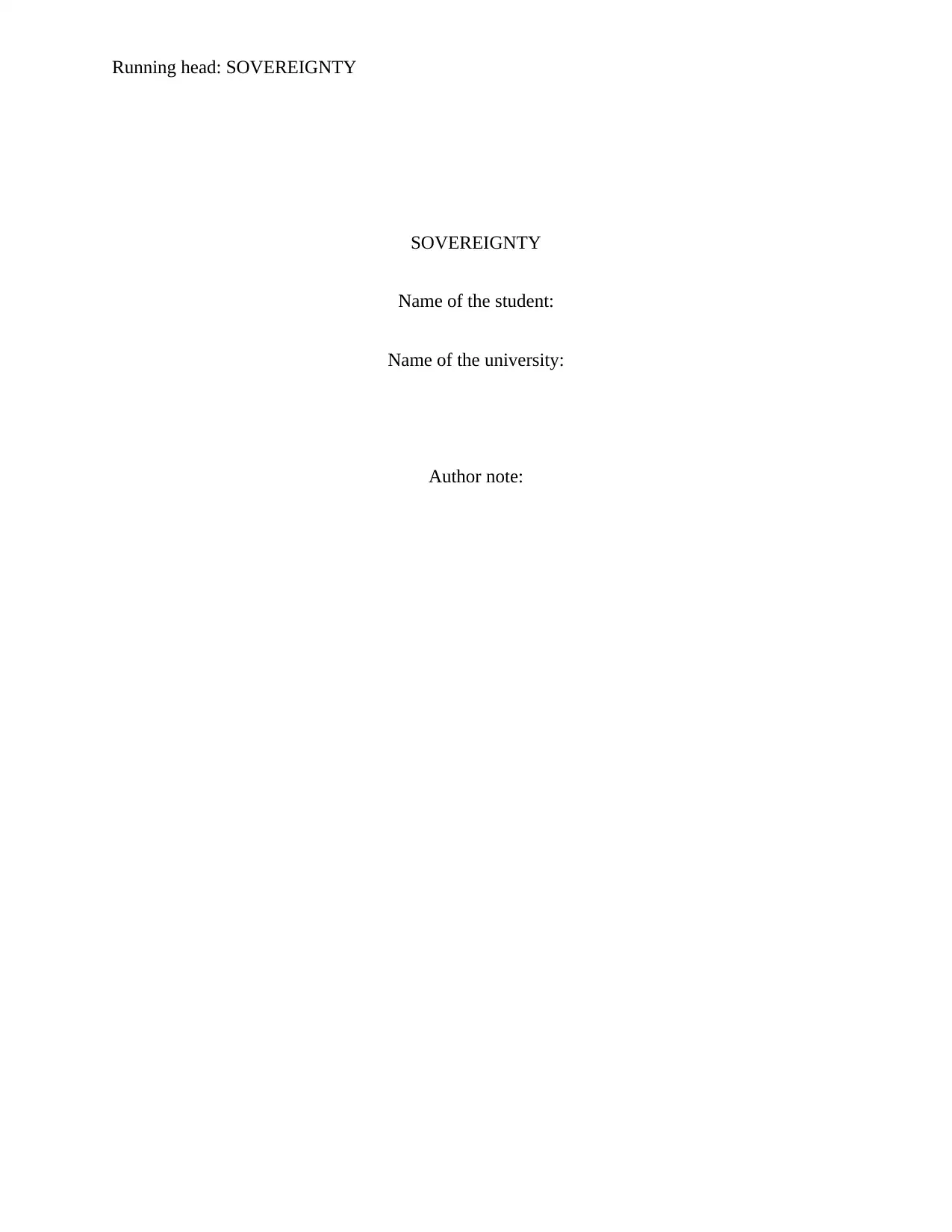
Running head: SOVEREIGNTY
SOVEREIGNTY
Name of the student:
Name of the university:
Author note:
SOVEREIGNTY
Name of the student:
Name of the university:
Author note:
Paraphrase This Document
Need a fresh take? Get an instant paraphrase of this document with our AI Paraphraser
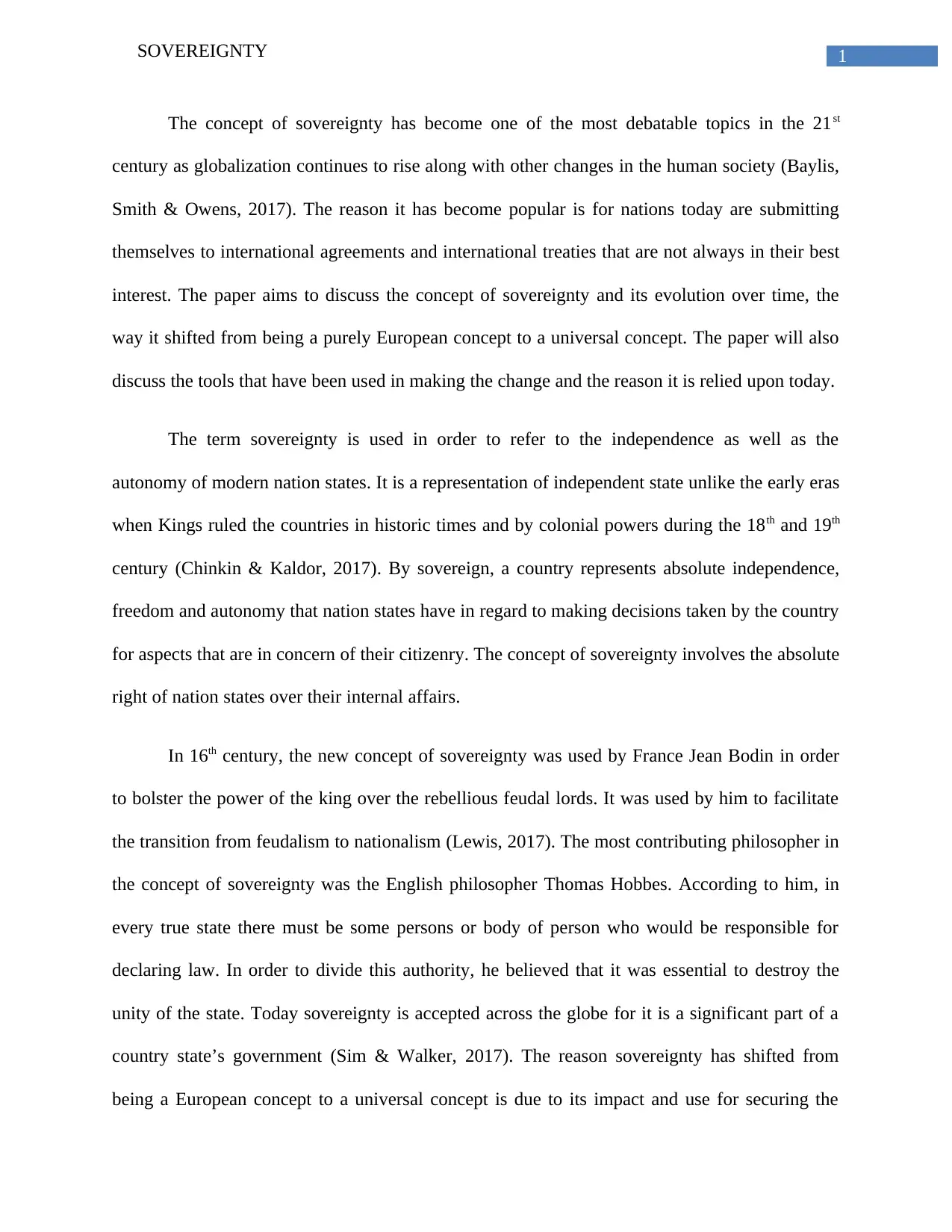
1SOVEREIGNTY
The concept of sovereignty has become one of the most debatable topics in the 21st
century as globalization continues to rise along with other changes in the human society (Baylis,
Smith & Owens, 2017). The reason it has become popular is for nations today are submitting
themselves to international agreements and international treaties that are not always in their best
interest. The paper aims to discuss the concept of sovereignty and its evolution over time, the
way it shifted from being a purely European concept to a universal concept. The paper will also
discuss the tools that have been used in making the change and the reason it is relied upon today.
The term sovereignty is used in order to refer to the independence as well as the
autonomy of modern nation states. It is a representation of independent state unlike the early eras
when Kings ruled the countries in historic times and by colonial powers during the 18th and 19th
century (Chinkin & Kaldor, 2017). By sovereign, a country represents absolute independence,
freedom and autonomy that nation states have in regard to making decisions taken by the country
for aspects that are in concern of their citizenry. The concept of sovereignty involves the absolute
right of nation states over their internal affairs.
In 16th century, the new concept of sovereignty was used by France Jean Bodin in order
to bolster the power of the king over the rebellious feudal lords. It was used by him to facilitate
the transition from feudalism to nationalism (Lewis, 2017). The most contributing philosopher in
the concept of sovereignty was the English philosopher Thomas Hobbes. According to him, in
every true state there must be some persons or body of person who would be responsible for
declaring law. In order to divide this authority, he believed that it was essential to destroy the
unity of the state. Today sovereignty is accepted across the globe for it is a significant part of a
country state’s government (Sim & Walker, 2017). The reason sovereignty has shifted from
being a European concept to a universal concept is due to its impact and use for securing the
The concept of sovereignty has become one of the most debatable topics in the 21st
century as globalization continues to rise along with other changes in the human society (Baylis,
Smith & Owens, 2017). The reason it has become popular is for nations today are submitting
themselves to international agreements and international treaties that are not always in their best
interest. The paper aims to discuss the concept of sovereignty and its evolution over time, the
way it shifted from being a purely European concept to a universal concept. The paper will also
discuss the tools that have been used in making the change and the reason it is relied upon today.
The term sovereignty is used in order to refer to the independence as well as the
autonomy of modern nation states. It is a representation of independent state unlike the early eras
when Kings ruled the countries in historic times and by colonial powers during the 18th and 19th
century (Chinkin & Kaldor, 2017). By sovereign, a country represents absolute independence,
freedom and autonomy that nation states have in regard to making decisions taken by the country
for aspects that are in concern of their citizenry. The concept of sovereignty involves the absolute
right of nation states over their internal affairs.
In 16th century, the new concept of sovereignty was used by France Jean Bodin in order
to bolster the power of the king over the rebellious feudal lords. It was used by him to facilitate
the transition from feudalism to nationalism (Lewis, 2017). The most contributing philosopher in
the concept of sovereignty was the English philosopher Thomas Hobbes. According to him, in
every true state there must be some persons or body of person who would be responsible for
declaring law. In order to divide this authority, he believed that it was essential to destroy the
unity of the state. Today sovereignty is accepted across the globe for it is a significant part of a
country state’s government (Sim & Walker, 2017). The reason sovereignty has shifted from
being a European concept to a universal concept is due to its impact and use for securing the
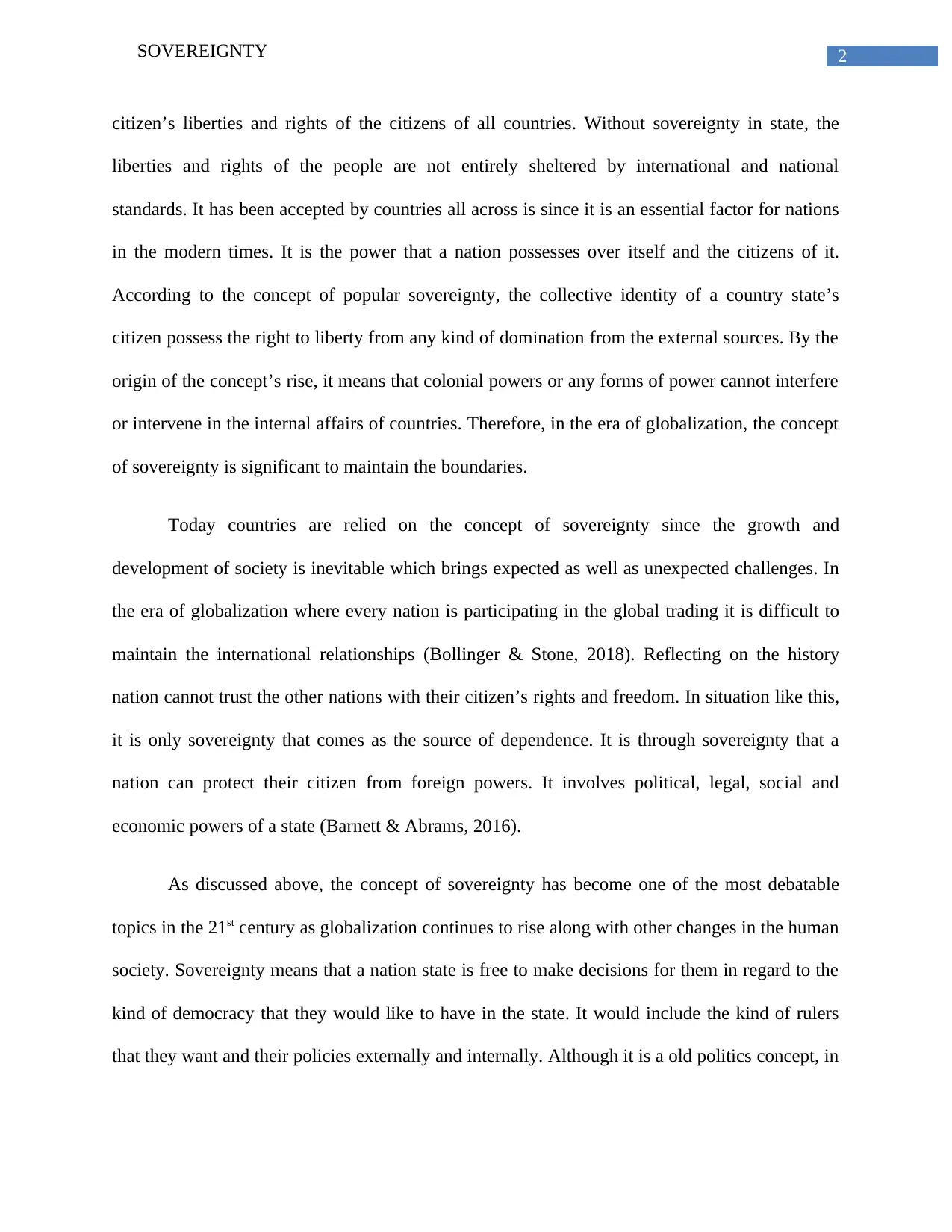
2SOVEREIGNTY
citizen’s liberties and rights of the citizens of all countries. Without sovereignty in state, the
liberties and rights of the people are not entirely sheltered by international and national
standards. It has been accepted by countries all across is since it is an essential factor for nations
in the modern times. It is the power that a nation possesses over itself and the citizens of it.
According to the concept of popular sovereignty, the collective identity of a country state’s
citizen possess the right to liberty from any kind of domination from the external sources. By the
origin of the concept’s rise, it means that colonial powers or any forms of power cannot interfere
or intervene in the internal affairs of countries. Therefore, in the era of globalization, the concept
of sovereignty is significant to maintain the boundaries.
Today countries are relied on the concept of sovereignty since the growth and
development of society is inevitable which brings expected as well as unexpected challenges. In
the era of globalization where every nation is participating in the global trading it is difficult to
maintain the international relationships (Bollinger & Stone, 2018). Reflecting on the history
nation cannot trust the other nations with their citizen’s rights and freedom. In situation like this,
it is only sovereignty that comes as the source of dependence. It is through sovereignty that a
nation can protect their citizen from foreign powers. It involves political, legal, social and
economic powers of a state (Barnett & Abrams, 2016).
As discussed above, the concept of sovereignty has become one of the most debatable
topics in the 21st century as globalization continues to rise along with other changes in the human
society. Sovereignty means that a nation state is free to make decisions for them in regard to the
kind of democracy that they would like to have in the state. It would include the kind of rulers
that they want and their policies externally and internally. Although it is a old politics concept, in
citizen’s liberties and rights of the citizens of all countries. Without sovereignty in state, the
liberties and rights of the people are not entirely sheltered by international and national
standards. It has been accepted by countries all across is since it is an essential factor for nations
in the modern times. It is the power that a nation possesses over itself and the citizens of it.
According to the concept of popular sovereignty, the collective identity of a country state’s
citizen possess the right to liberty from any kind of domination from the external sources. By the
origin of the concept’s rise, it means that colonial powers or any forms of power cannot interfere
or intervene in the internal affairs of countries. Therefore, in the era of globalization, the concept
of sovereignty is significant to maintain the boundaries.
Today countries are relied on the concept of sovereignty since the growth and
development of society is inevitable which brings expected as well as unexpected challenges. In
the era of globalization where every nation is participating in the global trading it is difficult to
maintain the international relationships (Bollinger & Stone, 2018). Reflecting on the history
nation cannot trust the other nations with their citizen’s rights and freedom. In situation like this,
it is only sovereignty that comes as the source of dependence. It is through sovereignty that a
nation can protect their citizen from foreign powers. It involves political, legal, social and
economic powers of a state (Barnett & Abrams, 2016).
As discussed above, the concept of sovereignty has become one of the most debatable
topics in the 21st century as globalization continues to rise along with other changes in the human
society. Sovereignty means that a nation state is free to make decisions for them in regard to the
kind of democracy that they would like to have in the state. It would include the kind of rulers
that they want and their policies externally and internally. Although it is a old politics concept, in
⊘ This is a preview!⊘
Do you want full access?
Subscribe today to unlock all pages.

Trusted by 1+ million students worldwide
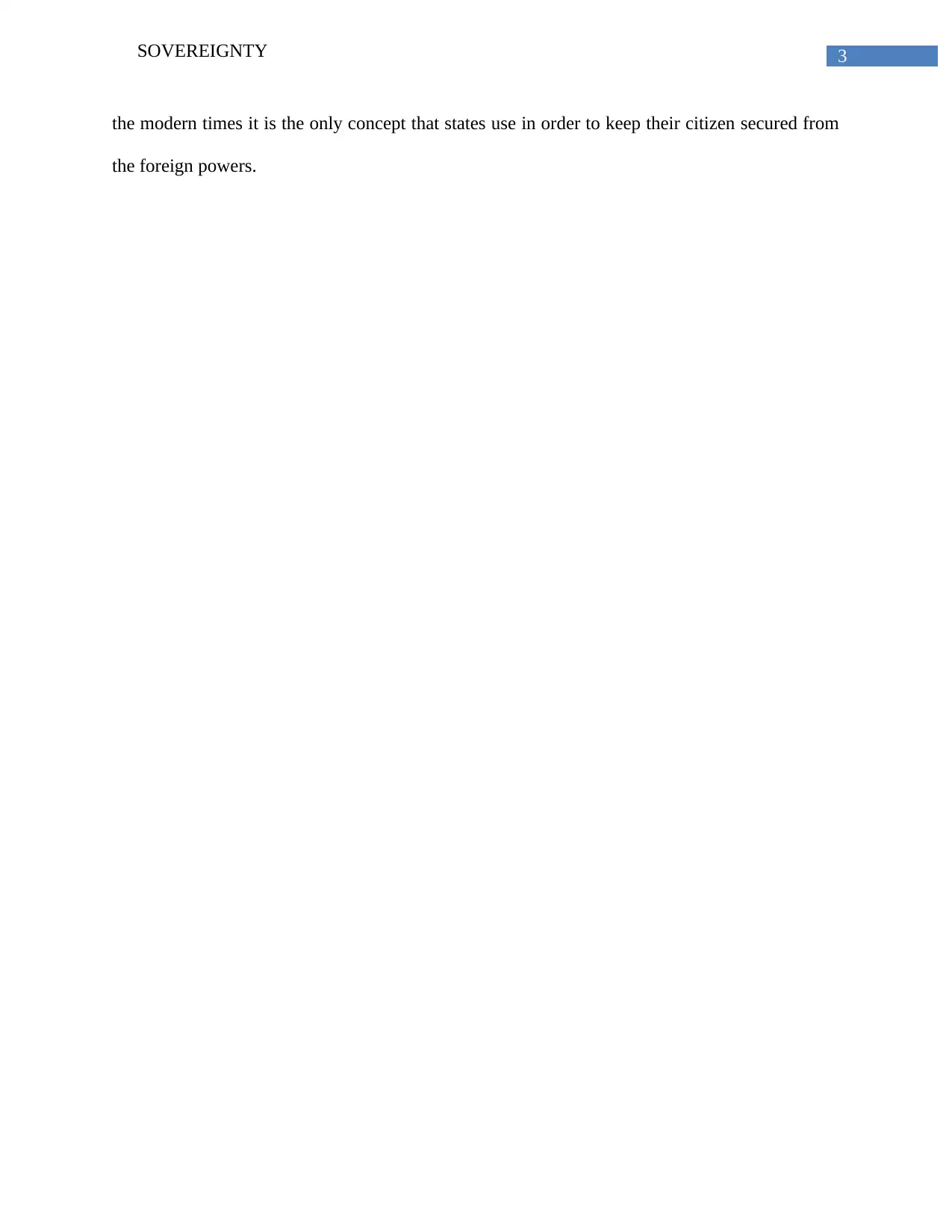
3SOVEREIGNTY
the modern times it is the only concept that states use in order to keep their citizen secured from
the foreign powers.
the modern times it is the only concept that states use in order to keep their citizen secured from
the foreign powers.
Paraphrase This Document
Need a fresh take? Get an instant paraphrase of this document with our AI Paraphraser
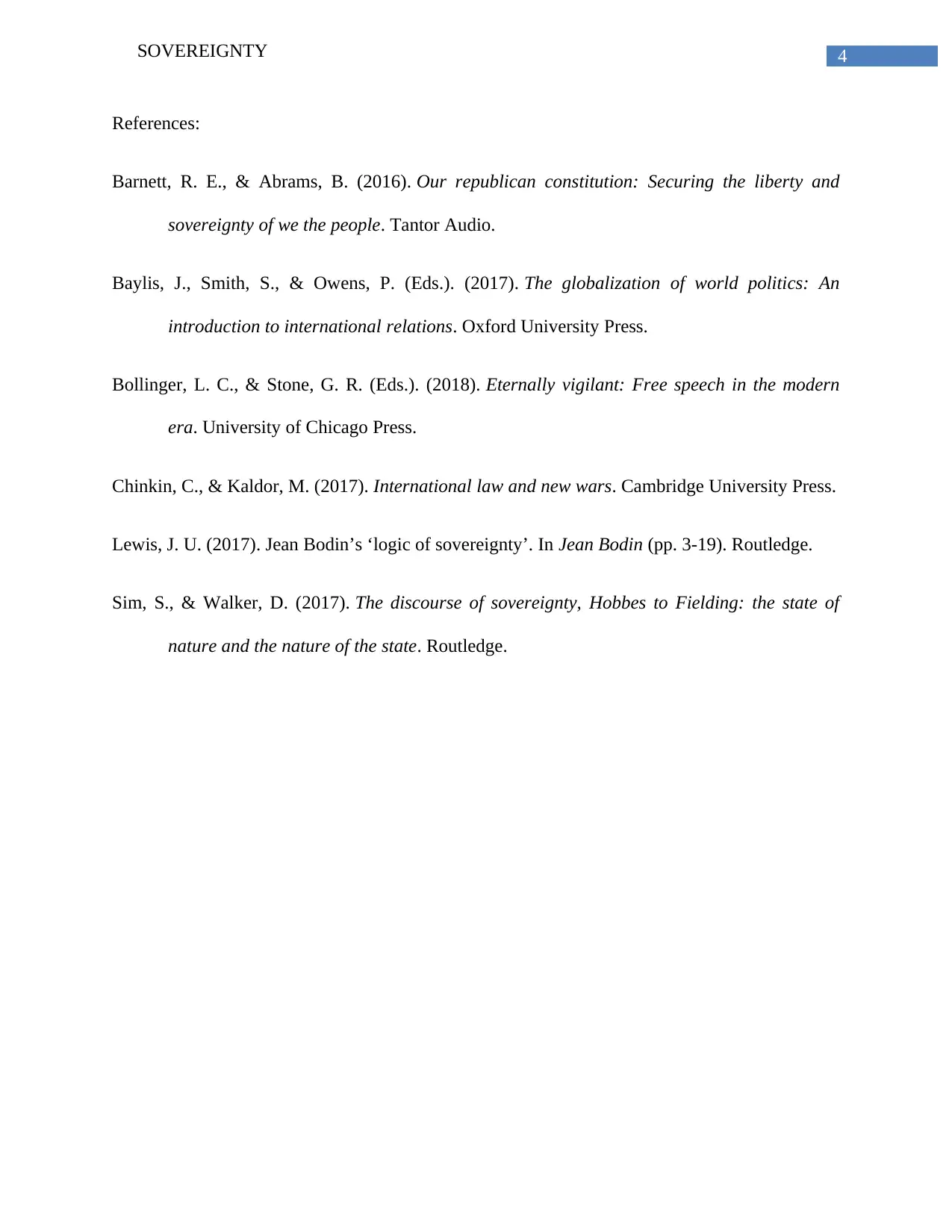
4SOVEREIGNTY
References:
Barnett, R. E., & Abrams, B. (2016). Our republican constitution: Securing the liberty and
sovereignty of we the people. Tantor Audio.
Baylis, J., Smith, S., & Owens, P. (Eds.). (2017). The globalization of world politics: An
introduction to international relations. Oxford University Press.
Bollinger, L. C., & Stone, G. R. (Eds.). (2018). Eternally vigilant: Free speech in the modern
era. University of Chicago Press.
Chinkin, C., & Kaldor, M. (2017). International law and new wars. Cambridge University Press.
Lewis, J. U. (2017). Jean Bodin’s ‘logic of sovereignty’. In Jean Bodin (pp. 3-19). Routledge.
Sim, S., & Walker, D. (2017). The discourse of sovereignty, Hobbes to Fielding: the state of
nature and the nature of the state. Routledge.
References:
Barnett, R. E., & Abrams, B. (2016). Our republican constitution: Securing the liberty and
sovereignty of we the people. Tantor Audio.
Baylis, J., Smith, S., & Owens, P. (Eds.). (2017). The globalization of world politics: An
introduction to international relations. Oxford University Press.
Bollinger, L. C., & Stone, G. R. (Eds.). (2018). Eternally vigilant: Free speech in the modern
era. University of Chicago Press.
Chinkin, C., & Kaldor, M. (2017). International law and new wars. Cambridge University Press.
Lewis, J. U. (2017). Jean Bodin’s ‘logic of sovereignty’. In Jean Bodin (pp. 3-19). Routledge.
Sim, S., & Walker, D. (2017). The discourse of sovereignty, Hobbes to Fielding: the state of
nature and the nature of the state. Routledge.
1 out of 5
Related Documents
Your All-in-One AI-Powered Toolkit for Academic Success.
+13062052269
info@desklib.com
Available 24*7 on WhatsApp / Email
![[object Object]](/_next/static/media/star-bottom.7253800d.svg)
Unlock your academic potential
Copyright © 2020–2026 A2Z Services. All Rights Reserved. Developed and managed by ZUCOL.





